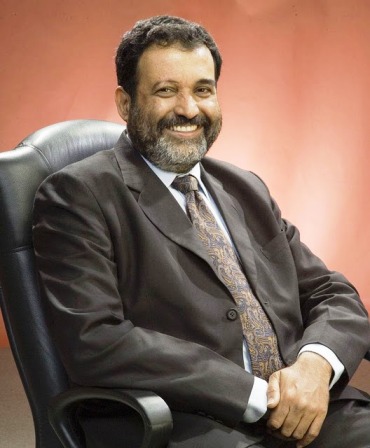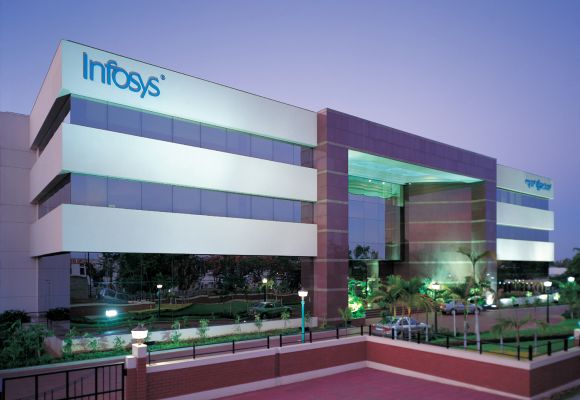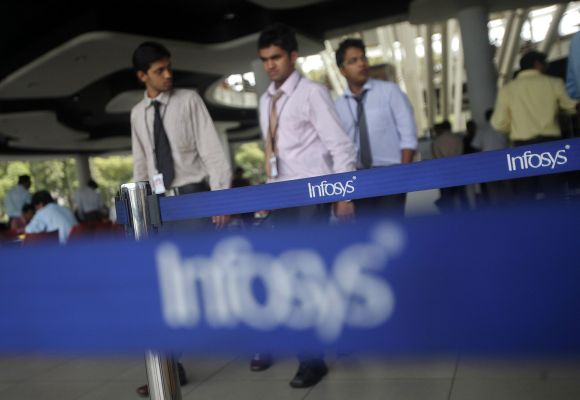 | « Back to article | Print this article |
Founders at helm is Infosys' biggest problem
The stranglehold of the founders over the Infosys management has actually strengthened after the recent changes: Mr Murthy is the executive chairman, Mr Gopalakrishnan the executive vice-chairman and Mr Shibulal the managing director and CEO.
N R Narayana Murthy's return to Infosys as the executive chairman, with son Rohan Murty in tow as executive assistant, has sent shock waves through corporate circles.
Can you imagine Ratan Tata returning after a few years to manage the affairs of Tata Sons? Or Sunil Mittal running Bharti Airtel in 2024 when he turns 67?
For all we know, Mr Murthy may take Infosys out of the current mess. And people like Steve Jobs and Michael Dell have made successful comebacks in the past.
The stock market is convinced that with Mr Murthy's return, bad days are over for the company; that's why the Infosys stock climbed sharply after the announcement last Saturday.
Click NEXT to read more...
Founders at helm is Infosys' biggest problem
But the debate is not about Mr Murthy's ability to manage Infosys - it is about the signals it has sent out.
One, in spite of its image of a post-modern corporation and a role model for corporate governance, Infosys remains heavily founder-driven.
Ever since its inception more than 30 years ago, it has been steered by a founder: Narayana Murthy followed by Nandan Nilekani, Kris Gopalakrishnan and S D Shibulal.
Growth in revenue and profits was the highest when the company was led by Mr Murthy, and has fallen steadily with each successor.
Though maintaining the tempo becomes difficult as the business gains in size, it is not unreasonable to assume that the quality of leadership has suffered after Mr Murthy.
So the system of appointing a promoter as the CEO may not have been in the best interests of the company. It's like the armed forces: the command goes to the senior most person in the queue, not the best.
Click NEXT to read more...
Founders at helm is Infosys' biggest problem
The stranglehold of the founders over the Infosys management has actually strengthened after the recent changes: Mr Murthy is the executive chairman, Mr Gopalakrishnan the executive vice-chairman and Mr Shibulal the managing director and CEO.
Experience tells us that a company needs entrepreneurial drive in its formative years, not when it is over 30 years old, billions of dollars in size, employs several thousands and has operations spread across the world.
That is when the baton needs to be handed over to the professionals. It is the job of the founders to find leaders who can take over from them once critical mass has been attained. This has clearly not happened at Infosys.
Writing for Business Standard, T V Mohandas Pai, the former CFO and head of human resources of Infosys and a one-time contender for the CEO's post, said that this "culture of a founder-led and founder-centric governing model" has cost the company "three generations of leaders over the past 25 years".
Click NEXT to read more...
Founders at helm is Infosys' biggest problem
Not that there is a shortage of talent in the company. Mr Pai wrote in the same article: "Infosys has at least 100 leaders who could be CEOs of small, medium and large companies. Many of them have left and are CEOs elsewhere and performing well. They need to be given their day in the sun."
Two, a structure more confusing than the current one is difficult to imagine: an executive chairman, an executive chairman and an MD and CEO. Who calls the shots? Where does the buck stop?
Another question that remains unanswered is: who is responsible for the dip in the company's performance? Profit margins have come under pressure. Productivity gains have been offset by salary increases.
The final straw was the company's recent communication that revenue will grow just 6 to 10 per cent in 2013-14 - way below the expected industry growth of 14 per cent.
It would be easy to blame the slowdown for the mess, but rivals like TCS and Wipro have outperformed Infosys by a mile.
Click NEXT to read more...
Founders at helm is Infosys' biggest problem
Good management requires achievers to be rewarded and laggards to be punished, however mighty and powerful they might be; we haven't heard anything from Infosys on this.
Heads would have rolled in any other company. Or, had the CEO of Infosys been a professional and not a founder, would the board have given him more time?
To reassure all the stakeholders, the company needs to take some action; it can't afford to go soft on people who have caused the performance to decline.
The third takeaway is that the business scenario has become so bleak for the company that it is willing to live with the bad press Mr Murthy's return has fetched and the demoralising effect it is bound to have on its senior leadership.
Commentators have been severe. "By reappointing Narayana Murthy as an executive chairman, the board and the nominations committee seem to have been ineffective in arriving at an orderly succession plan," Shriram Subramanian, the managing director of InGovern, wrote in The Economic Times.
Click NEXT to read more...
Founders at helm is Infosys' biggest problem
"The board seems to have found it difficult to find leadership both inside and outside the company." What this also shows is that Brand Narayana Murthy is perhaps stronger than Brand Infosys.
Four, the appointment of his son as executive assistant to Narayana Murthy flies on the face of good corporate governance.
Infosys had always said that the founders will never send their children to work for the company. Rohan Murty's appointment, however qualified he might be, has sent out all the wrong signals.
The appointment, according to Mr Subramanian, smacks of nepotism. "Given that the average age of the company is 27, and there are many young leaders, it is surprising that the executive chairman found it important to groom his son and induct him as executive assistant, rather than groom youngsters in the company for future leadership," he wrote.
Does this mean that the other promoters can now get their children to work for Infosys? Perhaps this is a one-off case and will not be repeated. But the halo around Infosys certainly stands diminished.






